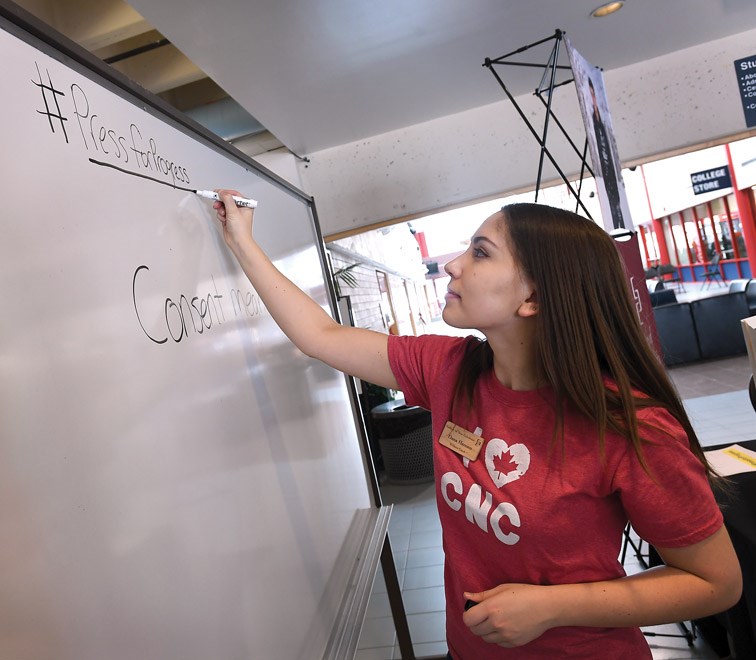The administration of the College of New Caledonia hope a recently launched campaign will get students talking about sexual assault and consent.
On Thursday, staff at CNC launched the Red Phone Project, a campaign to inform students about the on-campus supports that exist for students who may have experienced sexual assault. The campus now has a procedure in place for a college-lead investigation, should a student report an incidence of a sexual assault on campus, and also has trained mental health staff on campus to assist students. Red-coloured phones, located throughout CNC's Prince George campus, connect directly to campus security for students in need of immediate help.
The campaign was initiated to draw attention to CNC's student sexual misconduct policy. The policy was initially passed by the college's board of governors in May of last year, and establishes provisions for disclosure, complaints and reports of sexual assault.
Students who disclose a sexual assault to a health professional or another staff member of the college are entitled to academic accommodation. A student who makes a formal complaint will invoke an investigation by staff of the college, who will also seek to provide “clear, appropriate and fair processes for handling complaints of sexual misconduct,” according to the policy. A student who is accused of sexual assault will be given notice of the allegations, and will be provided with an opportunity to respond.
A student also has the option of reporting the incident to law enforcement, in which the RCMP would pursue an investigation, and the college would provide the student with requested support, from mental health services to academic accommodation.
According to Kim Swarts, CNC's acting executive director of human resources, the policy was developed as a result of a law enacted by the provincial government in 2017, which mandated all public post-secondary institutions to develop sexual assault policies.
CNC's initiative will include training for staff and faculty on the subject of sexual assault.
"We have procedures in place and we have education in place. We have some formal education that's going to be rolling out to employees in the next month or so," Swarts said.
"It's one thing to have a policy but it's really another thing to educate people about it, create processes around it to ensure that when something happens on campus, we're ready for it," said Alyson Gourley-Cramer, executive director of communication for CNC.
Dana Hansen, a wellness coach who provides mental health support for students, said students who disclose a sexual assault will receive support based on their own preferences.
"We can actually accompany the student from any meetings around that," Hansen said.
The provincial law was passed following a series of widely publicized sexual assaults at UBC. In 2016, UBC's administration developed its own policy for how the university would deal with sexual assaults, but the initial policy received heavy criticism by survivors of sexual assault, who felt that their concerns were not incorporated.
According to Mankiran Powar, the student women's representative of CNC's Students' Union, the administration of CNC performed its due diligence in consulting with students, faculty and staff of the college prior to enacting their policy.
But Powar said the student body of CNC has changed in recent years, with increasing numbers of international students enrolling at the college, who may be less aware of the on-campus support.
"It is different from two years ago. There were not many [international] students here at CNC, but now there are students from different cultures, different countries so now it's more important to have these things on campus," Powar said.
"When I came here two years ago, I was the only Indian student in my class."
International students now account for 11 per cent of CNC's student population, according to the Ministry of Advance Education, Skills & Training.
Powar said the two mental health staff on campus are well equipped to support international students who may experience sexual assault or misconduct. However, she said international students may also face cultural and language barriers that might prevent them from accessing these supports.
"They have to be aware that there is a policy through which they can come to these people. These people are going to help them. There is confidentiality and there is a procedure to go through and they will get help in any way possible," Powar said.
Although no sexual assaults have been reported in recent memory at CNC, Powar said she has encountered some CNC students who have experienced stalking and cyberstalking.



